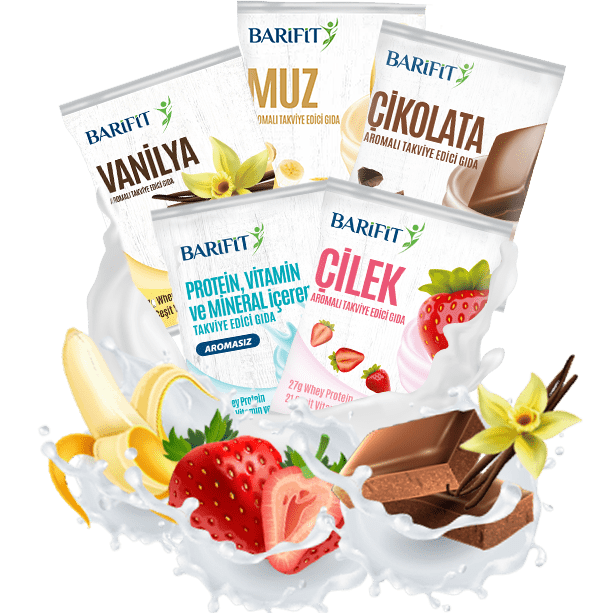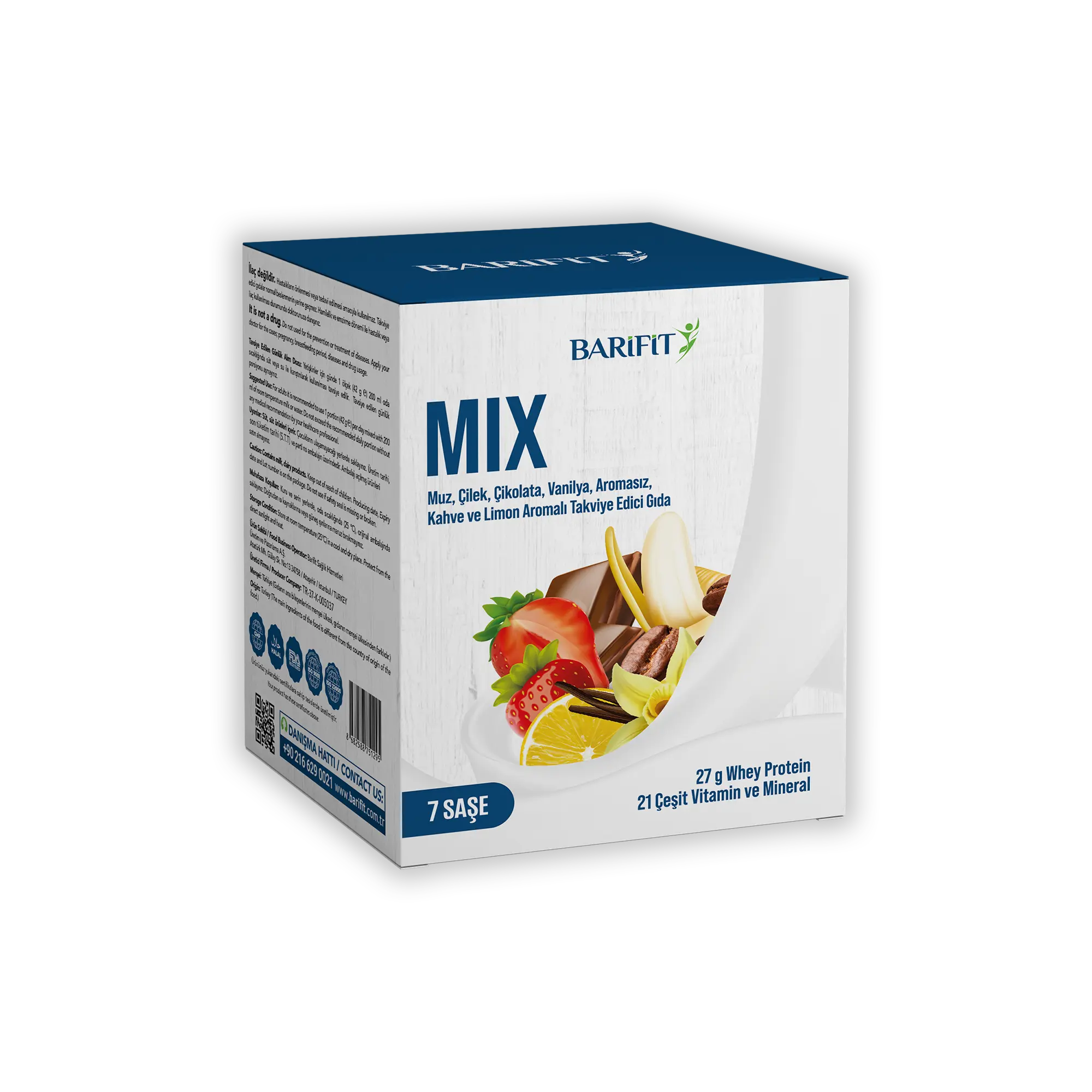Categories
Sepete Ekle
BARİFİT® PROTEIN SUPPLEMENTS
Contains whey protein isolate. Proteins contribute to increase muscle mass and maintain normal muscle mass and bones. Contains high fiber. Prebiotic fibers support the development and life of probiotic microorganisms in the intestine, which helps regulate the digestive system and support the immune system.
It is rich in vitamins and minerals. It contributes to the reduction of fatigue and exhaustion.
Reference: T.C. Official newspaper. Turkish Food Codex Regulation on Nutrition and Health Claims. 26.01.2017. Issue : 29960
It is rich in vitamins and minerals. It contributes to the reduction of fatigue and exhaustion.
Reference: T.C. Official newspaper. Turkish Food Codex Regulation on Nutrition and Health Claims. 26.01.2017. Issue : 29960
 %100 İsolated Whey Protein
%100 İsolated Whey Protein  21 Kinds of Vitamins & Minerals
21 Kinds of Vitamins & Minerals Low Carbs
Low Carbs No Added Sugar
No Added Sugar Gluten Free
Gluten Free
Contents
It is a food supplement containing 100% Isolated Whey Protein, Prebiotic Fiber, 21 kinds of vitamins and minerals.
Energy and Nutrients
Quantity / 1 sachet
Energy
156 kcal
Protein
27 g
Total Oil
2 g
Carbohydrate
8 g
Total Fiber
5 g
Vitamins
Quantity / 1 sachet
Vitamin A
750 µg (RE)
Vitamin B1
1,2 mg
Vitamin B2
0,85 mg
Vitamin B3
10 mg (NE)
Vitamin B5
10 mg
Vitamin B6
1 mg
Vitamin B12
10 µg
Vitamin C
50 mg
Vitamin D3
15 µg
Vitamin E
13,50 mg (α-TE)
Vitamin K
40 µg
Folic Acid
400 µg
Biotin
150 µg
Minerals
Quantity / 1 Sachet
Magnesium
61 mg
Iron
9 mg
Zinc
7,5 mg
Iodine
75 µg
Copper
1000 µg
Chromium
60 µg
Selenium
55 µg
Molybdenum
37,5 µg
Vitamins And Minerals
Vitamins, are organic compounds that are not synthesized at a rate in the body, are necessary for life, and stimulate important reactions in cell metabolism in very small amounts. Vitamins are essential for maintaining human health. Mineralsare common inorganic substances in nature. Minerals are needed for the growth and development of the body, sustaining life and maintaining health.
Reference: Samur G. ‘’Vitamin Mineraller ve Sağlığımız’’, Sağlık Bakanlığı, Şubat 2008, Ankara
Reference: Samur G. ‘’Vitamin Mineraller ve Sağlığımız’’, Sağlık Bakanlığı, Şubat 2008, Ankara
Vitamins
A B1 B2 B3 B5 B6 B12 C D K Kolin Biotin Folat
- Contributes to normal iron metabolism.
- Contributes to the preservation of normal mucosa.
- Contributes to the maintenance of normal skin.
- Contributes to the maintenance of normal vision.
- Contributes to the normal function of the immune system.
- It has a role in cell specialization.
- Contributes to normal energy-yielding metabolism.
- Contributes to the normal function of the heart.
- Contributes to normal energy-yielding metabolism.
- Contributes to the preservation of normal mucosa.
- Contributes to the maintenance of normal red blood cells.
- Contributes to the maintenance of normal skin.
- Contributes to the maintenance of normal vision.
- Contributes to the normal metabolism of iron.
- Contributes to the reduction of fatigue and exhaustion.
- Contributes to normal energy-yielding metabolism.
- Contributes to the preservation of normal mucosa.
- Contributes to the maintenance of normal skin.
- Contributes to the reduction of fatigue and exhaustion.
- Contributes to normal energy-yielding metabolism.
- Contributes to the normal synthesis and metabolism of steroid hormones, vitamin D and some neurotransmitters.
- Contributes to the reduction of fatigue and exhaustion.
- Contributes to normal energy-yielding metabolism.
- Contributes to normal cysteine synthesis.
- Contributes to the metabolism of normal homocysteine.
- Contributes to normal protein and glycogen metabolism.
- Contributes to the formation of normal red blood cells.
- Contributes to the normal function of the immune system.
- Contributes to the reduction of fatigue and exhaustion.
- Contributes to normal energy-yielding metabolism.
- Contributes to normal homocysteine metabolism.
- Contributes to normal red blood cell formation.
- Contributes to the normal function of the immune system.
- Vitamin B12 contributes to the reduction of fatigue and exhaustion.
- Vitamin B12 has a role in cell division.
- Contributes to the maintenance of the normal function of the immune system during and after intense physical exercise.
- Contributes to normal collagen formation, which is essential for the normal function of blood vessels, bones, cartilage, teeth, gums and skin.
- Contributes to normal energy-yielding metabolism.
- Contributes to the normal function of the immune system.
- Contributes to the reduction of fatigue and exhaustion.
- Contributes to the regeneration of the reduced form of vitamin E.
- Improves iron absorption.
- Contributes to the normal absorption/use of calcium and phosphorus.
- Contributes to normal blood calcium level.
- Contributes to the maintenance of normal bones.
- Contributes to the maintenance of normal muscle function.
- Contributes to the preservation of normal teeth.
- Contributes to the normal function of the immune system.
- It has a role in cell division.
- Contributes to normal blood coagulation.
- Contributes to the maintenance of normal bones.
- Contributes to normal homocysteine metabolism.
- Contributes to normal lipid metabolism.
- Contributes to the maintenance of normal liver function.
- Contributes to normal energy-yielding metabolism.
- Normal macronutrients contribute to metabolism.
- Contributes to the maintenance of normal hair.
- Contributes to the preservation of normal mucosa.
- Contributes to the maintenance of normal skin.
- Contributes to normal amino acid synthesis.
- Contributes to normal blood formation.
- Contributes to normal homocysteine metabolism.
- Contributes to the normal function of the immune system.
- Contributes to the reduction of fatigue and exhaustion.
- It has a role in cell division.
Minerals
Magnesium Iron Zinc Copper Chromium Selenium Calcium Iodine Molybdenum Manganese
- It contributes to the reduction of fatigue and exhaustion.
- Contributes to electrolyte balance.
- Contributes to normal energy-yielding metabolism.
- Contributes to normal muscle function, protein synthesis, maintenance of bones and teeth.
- It has a role in cell division.
- Contributes to normal energy-yielding metabolism.
- Contributes to the normal formation of red blood cells and hemoglobin.
- Contributes to normal oxygen transport in the body.
- Contributes to the normal function of the immune system.
- Contributes to the reduction of fatigue and exhaustion.
- It has a role in cell division.
- Contributes to normal acid-base metabolism.
- Contributes to normal carbohydrate metabolism.
- Contributes to normal DNA synthesis.
- Contributes to normal macronutrient metabolism.
- Contributes to the normal metabolism of fatty acids.
- Contributes to the normal metabolism of vitamin A.
- Contributes to normal protein synthesis, maintenance of bones, hair, nails and skin.
- Contributes to the maintenance of normal vision.
- Contributes to the normal function of the immune system.
- It has a role in cell division.
- Contributes to the protection of normal connective tissues.
- Contributes to normal energy-yielding metabolism.
- Contributes to normal skin and hair pigmentation.
- Contributes to the normal function of the immune system.
- Contributes to normal macronutrient metabolism.
- Contributes to the protection of normal hair and nails.
- Contributes to the normal function of the immune system.
- Contributes to normal thyroid function.
- Contributes to normal energy-yielding metabolism.
- Contributes to normal muscle function.
- Contributes to the normal function of digestive enzymes.
- It has a role in cell division and specialization process.
- Necessary for the preservation of normal bones and teeth.
- Contributes to normal energy-yielding metabolism.
- Contributes to the maintenance of normal skin.
- Contributes to the normal production of thyroid hormones and normal thyroid function.
- Contributes to the normal metabolism of sulfur-containing amino acids.
- Contributes to normal energy-yielding metabolism.
- Contributes to the maintenance of normal bones.
- Contributes to the normal formation of connective tissue.
Frequently Asked Questions
What do proteins do?
Proteins are one of the basic building blocks of our body and cannot be stored. Each protein in our body is a tissue that already has a task. However, we cannot produce all of the essential amino acids, which are the building blocks of protein, in our body, so it is imperative that we get these amino acids from food on a regular basis.
Reference:Türkiye Beslenme Rehberi 2015 (TÜBER), 2016 Ankara.
Reference:Türkiye Beslenme Rehberi 2015 (TÜBER), 2016 Ankara.
Can protein supplement be used after bariatric surgery?
Especially in the early period after bariatric surgery, it is almost impossible to provide adequate daily protein intake with only food, due to the difficulty in consuming protein-containing foods and the low amount consumed. Insufficient protein intake causes loss of protein-containing tissues (such as muscle tissue) in the body. This can cause many health problems. Protein supplementation will support daily protein intake in this process.
References:
1-ASMBS, Nutritional Guidelines
2-2016 TEMD, Bariyatrik cerrahisi Kılavuzu
3-2018 Batar N. ‘’ Bariatrik cerrahiside Beslenme İlkeleri’’, Bakırköy Tıp Dergisi 2019;15:323-3
References:
1-ASMBS, Nutritional Guidelines
2-2016 TEMD, Bariyatrik cerrahisi Kılavuzu
3-2018 Batar N. ‘’ Bariatrik cerrahiside Beslenme İlkeleri’’, Bakırköy Tıp Dergisi 2019;15:323-3
Is protein supplementation recommended after bariatric surgery?
Protein supplementation is recommended in the early postoperative period according to the bariatric surgery guidelines of ASMBS (American Society of Metabolic and Bariatric Surgery) and TEMD (Turkish Society of Endocrinology and Metabolism).
References:
1-ASMBS, Nutritional Guidelines
2-2016 TEMD, Bariyatrik cerrahisi Kılavuzu
References:
1-ASMBS, Nutritional Guidelines
2-2016 TEMD, Bariyatrik cerrahisi Kılavuzu
Can people who have had diabetes surgery use Barifit® protein supplement?
Flavored Barifit® protein supplements contains sweetener (sucralose) without sugar. Also, unflavored Barifit® protein supplement< em> does not contain both sugar and sweetener.
Sucralose, FDA approved is a sweetener. Studies show that sucralose has little or no effect on blood sugar and insulin levels1. However, in a small study of morbidly obese people who did not consume sucralose regularly, it was reported that it slightly increased blood sugar and insulin levels2. Considering these studies, it is thought that if people who have had diabetes surgery have never used sweetener before, the use of sweeteners together with the metabolic changes that occur with the surgery may have a small effect on blood sugar. For this reason, it will be safer for people who have had diabetes surgery to use Barifit® unflavored protein supplements.
Referanslar:
1-Pepino MY, Tiemann CD, Patterson BW, Wice BM, Klein S. ‘’ Sucralose affects glycemic and hormonal responses to an oral glucose load’’, Diabetes Care. 2013 Sep;36(9):2530-5.
2-Ma J, Bellon M, Wishart JM, Young R, Blackshaw LA, Jones KL, Horowitz M, Rayner CK. ‘’ Effect of the artificial sweetener, sucralose, on gastric emptying and incretin hormone release in healthy subjects’’, Am J Physiol Gastrointest Liver Physiol. 2009 Apr;296(4):G735-9.
Sucralose, FDA approved is a sweetener. Studies show that sucralose has little or no effect on blood sugar and insulin levels1. However, in a small study of morbidly obese people who did not consume sucralose regularly, it was reported that it slightly increased blood sugar and insulin levels2. Considering these studies, it is thought that if people who have had diabetes surgery have never used sweetener before, the use of sweeteners together with the metabolic changes that occur with the surgery may have a small effect on blood sugar. For this reason, it will be safer for people who have had diabetes surgery to use Barifit® unflavored protein supplements.
Referanslar:
1-Pepino MY, Tiemann CD, Patterson BW, Wice BM, Klein S. ‘’ Sucralose affects glycemic and hormonal responses to an oral glucose load’’, Diabetes Care. 2013 Sep;36(9):2530-5.
2-Ma J, Bellon M, Wishart JM, Young R, Blackshaw LA, Jones KL, Horowitz M, Rayner CK. ‘’ Effect of the artificial sweetener, sucralose, on gastric emptying and incretin hormone release in healthy subjects’’, Am J Physiol Gastrointest Liver Physiol. 2009 Apr;296(4):G735-9.
Barifit® How to use protein supplements?
Barifit® can consume protein supplement by mixing it with 200 ml of lactose-free milk, kefir, light milk, yogurt or soy/ almond/ hazelnut milk. Add 200 ml of one of the above-mentioned liquids into the mixer and pour 1 package of Barifit protein supplement 4 tablespoons (42 g) into it. You can consume it after mixing it well by shaking it.
Barifit®When is the protein supplement used during the day?
You can consume it at any time of the day in accordance with the nutrition plan prepared for you, in line with the recommendation of your doctor or dietitian..
Barifit® What should be considered while preparing the protein supplement ?
The milk/water or yogurt you mix the Barifit® protein supplement should be in the refrigerator or at room temperature. The protein supplement is not heated or cooked on the stove. You can mix the protein supplement with your pre-cooked, warm foods.
Barifit® What is the dosage of protein supplement?
It is recommended to use 1 pack (42 g) per day for adults (11 years and older). For higher usage amounts, consult your doctor.
Barifit® From what age can protein supplement be used?
All healthy individuals aged 11 and over can use it.
Barifit® How long does the protein supplement show its effect?
Since the absorption / distribution of each nutrient in the body will differ and the nutrient deficiencies of each individual in the body are at different levels, the effect of the product differs from person to person, it is not possible to give a specific effect time.
Barifit® can be used during pregnancy or lactation?
Nutrition during pregnancy and lactation is a very important period in terms of the growth of the baby and the changes in the needs of the mother depending on this process. For this reason, you should definitely consult your doctor about any supplement to be used in this process.
What are the storage conditions of Barifit® protein supplement?
Store in dry and cool places at room temperature in its original packaging. Do not expose to direct heat sources or sunlight.
Barifit® Does protein supplement have any allergic side effects?
Barifit®protein supplement contains milk and dairy products. Not recommended for those with cow's milk allergy. Individuals with an allergic body are recommended to use Barifit®protein supplement in consultation with their doctor, as with any product use.
Barifit® Does the protein supplement contain gluten?
There is no gluten-containing raw material in Barifit® protein supplement. Celiac patients are advised to consult their doctor for use.
Prepared by
T-Soft
E-Commerce.



